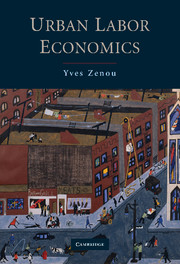Crossref Citations
This Book has been
cited by the following publications. This list is generated based on data provided by Crossref.
Gautier, Pieter A.
and
Zenou, Yves
2008.
Car Ownership and the Labor Markets of Ethnic Minorites.
SSRN Electronic Journal,
Zenou, Yves
and
Song, Yan
2008.
How Differences in Property Taxes within Cities Affect Urban Sprawl?.
SSRN Electronic Journal,
Song, Yan
and
Zenou, Yves
2009.
HOW DO DIFFERENCES IN PROPERTY TAXES WITHIN CITIES AFFECT URBAN SPRAWL?*.
Journal of Regional Science,
Vol. 49,
Issue. 5,
p.
801.
Fujita, Masahisa
and
Thisse, Jacques-François
2009.
New Economic Geography: An appraisal on the occasion of Paul Krugman's 2008 Nobel Prize in Economic Sciences.
Regional Science and Urban Economics,
Vol. 39,
Issue. 2,
p.
109.
Blien, Uwe
Phan, thi Hong Van
Kaufmann, Klara
and
Kaimer, Steffen
2010.
20 Jahre nach dem Mauerfall: Arbeitslosigkeit in ostdeutschen Regionen.
Zeitschrift für ArbeitsmarktForschung,
Vol. 43,
Issue. 2,
p.
125.
Epifani, Ilenia
and
Nicolini, Rosella
2011.
On the Population Density Distribution Across Space: A Probabilistic Approach.
SSRN Electronic Journal,
Zenou, Yves
2011.
RURAL-URBAN MIGRATION AND UNEMPLOYMENT: THEORY AND POLICY IMPLICATIONS*.
Journal of Regional Science,
Vol. 51,
Issue. 1,
p.
65.
Andersson, Fredrik Daniel
Haltiwanger, John C.
Kutzbach, Mark
Pollakowski, Henry O.
and
Weinberg, Daniel H.
2011.
Job Displacement and the Duration of Joblessness: The Role of Spatial Mismatch.
SSRN Electronic Journal,
Chapela, Jorge González
2012.
The Effect of Residential Location on Retirement Age: Theory and Some Evidence on Male Behaviour in the US.
Urban Studies,
Vol. 49,
Issue. 10,
p.
2153.
Zenou, Yves
2012.
Housing policies in China: Issues and options*.
Regional Science Policy & Practice,
Vol. 4,
Issue. 4,
p.
393.
Patuelli, Roberto
Schanne, Norbert
Griffith, Daniel A.
and
Nijkamp, Peter
2012.
PERSISTENCE OF REGIONAL UNEMPLOYMENT: APPLICATION OF A SPATIAL FILTERING APPROACH TO LOCAL LABOR MARKETS IN GERMANY*.
Journal of Regional Science,
Vol. 52,
Issue. 2,
p.
300.
Gaigne, Carl
Riou, Stephane
and
Thisse, Jacques-François
2013.
How to Make the Metropolitan Area Work? Neither Big Government, Nor Laissez-Faire.
SSRN Electronic Journal,
Epifani, Ilenia
and
Nicolini, Rosella
2013.
ON THE POPULATION DENSITY DISTRIBUTION ACROSS SPACE: A PROBABILISTIC APPROACH.
Journal of Regional Science,
Vol. 53,
Issue. 3,
p.
481.
Nathan, Max
and
Lee, Neil
2013.
Cultural Diversity, Innovation, and Entrepreneurship: Firm‐level Evidence from London.
Economic Geography,
Vol. 89,
Issue. 4,
p.
367.
Haas, Anette
and
Osland, Liv
2014.
Commuting, Migration, Housing and Labour Markets: Complex Interactions.
Urban Studies,
Vol. 51,
Issue. 3,
p.
463.
Bellit, Sonia
and
Détang-Dessendre, Cécile
2014.
Les salariés agricoles. Entre ancrage sectoriel et précarité.
Économie rurale,
p.
87.
Xiao, Wei
2014.
SEARCH FRICTIONS, UNEMPLOYMENT, AND HOUSING IN CITIES: THEORY AND POLICIES.
Journal of Regional Science,
Vol. 54,
Issue. 3,
p.
422.
Mulalic, Ismir
Van Ommeren, Jos N.
and
Pilegaard, Ninette
2014.
Wages and Commuting: Quasi-natural Experiments' Evidence from Firms that Relocate.
The Economic Journal,
Vol. 124,
Issue. 579,
p.
1086.
Heres, David R.
Jack, Darby
and
Salon, Deborah
2014.
Do public transport investments promote urban economic development? Evidence from bus rapid transit in Bogotá, Colombia.
Transportation,
Vol. 41,
Issue. 1,
p.
57.
Jordi, Catalina
and
Manjón, Miguel
2014.
The determinants of urban (un)employment duration: evidence from Barcelona.
The Annals of Regional Science,
Vol. 53,
Issue. 2,
p.
515.





